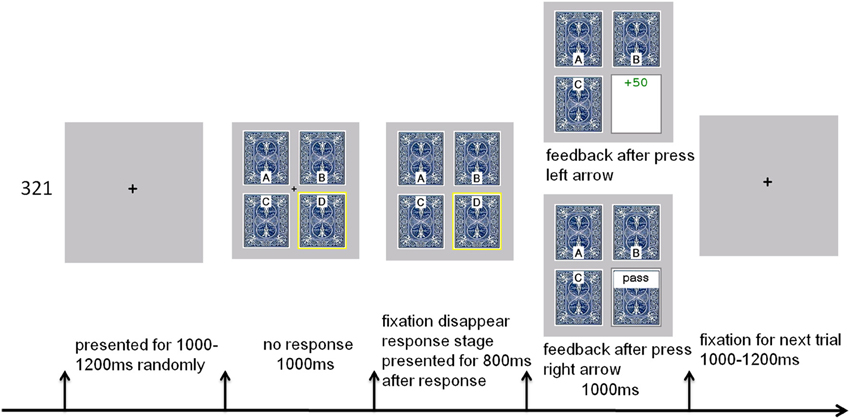Iowa Gambling Task Bechara 1994
A decision task designed to simulate real-life decision-making. On each trial the decision maker chooses a card from one of four decks, each choice resulting in a fixed gain of $100 for any card from two of the decks or $50 for any card from the other two, although the decision maker is not told this. For some cards, the decision maker also suffers a loss. Losses total $1,250 for every ten cards in two of the decks and $250 for every ten cards in the other two. These gains and losses are arranged so that two of the decks yield substantial expected losses and the other two substantial expected gains over every run of 10 cards, but there are sharp differences between short-term and long-term payoffs, small losses occurring relatively frequently in some decks and larger but less frequent losses occurring in others. The task was introduced by the Canadian neuroscientist Antoine Bechara (born 1961) and published with three colleagues in the journal Cognition in 1994, where it was shown that people with damage to the prefrontal cortex, in contrast to neurologically undamaged participants in their control group, performed badly, failing to consider the future consequences of their actions and being guided only by immediate prospects. See also somatic marker hypothesis. IGT abbrev. [So-called because the researchers who developed it were at the University of Iowa at the time]

INTRODUCTION In 1994, Bechara and colleagues published the first paper on the Iowa Gambling Task (IGT; Bechara et al., 1994). In this task subjects need to find a way to earn money in a context of variable wins and losses, conflicting short-term and long-term pay-off, and uncertainty of outcomes. We have leveraged our industry experience to Iowa Gambling Task Bechara Et Al 1994 work out some cool and exclusive no deposit bonuses from some of the best casinos around for US players. The bonus codes on our site are unique, which means you can use them only if you get to the casino through our website. The Iowa gambling task (IGT; Bechara, Damasio, Damasio, & Anderson, 1994)isoftenusedtoassessdecision-makingdeficitsinclinicalpopulations. The Iowa Gambling Task (IGT; Bechara, Damasio, Damasio, & Anderson, 1994) is often used to assess decision-making deficits in clinical populations. Humans: the Iowa Gambling Task 1.1 Developing a simulation of real-life decision-making When it was designed by Bechara and colleagues in the early 90s (Bechara et al., 1994), the IGT was meant to be a tool to specifically test impairements of decision-making in a controlled labo-ratory setting.



Iowa Gambling Task Bechara 1994 Episode

Iowa Gambling Task Online
A decision task designed to simulate real-life decision-making. On each trial the decision maker chooses a card from one of four decks, each choice resulting in a fixed gain of $100 for any card from two of the decks or $50 for any card from the other two, although the decision maker is not told this. For some cards, the decision maker also suffers a loss. Losses total $1,250 for every ten cards in two of the decks and $250 for every ten cards in the other two. These gains and losses are arranged so that two of the decks yield substantial expected losses and the other two substantial expected gains over every run of 10 cards, but there are sharp differences between short-term and long-term payoffs, small losses occurring relatively frequently in some decks and larger but less frequent losses occurring in others. The task was introduced by the Canadian neuroscientist Antoine Bechara (born 1961) and published with three colleagues in the journal Cognition in 1994, where it was shown that people with damage to the prefrontal cortex, in contrast to neurologically undamaged participants in their control group, performed badly, failing to consider the future consequences of their actions and being guided only by immediate prospects. See also somatic marker hypothesis. IGT abbrev. [So-called because the researchers who developed it were at the University of Iowa at the time]